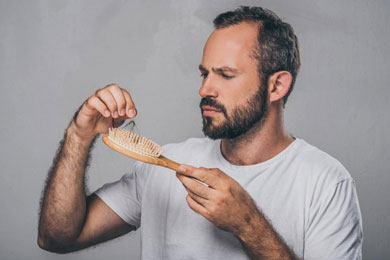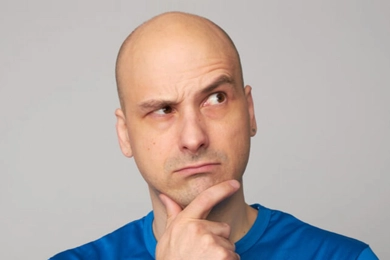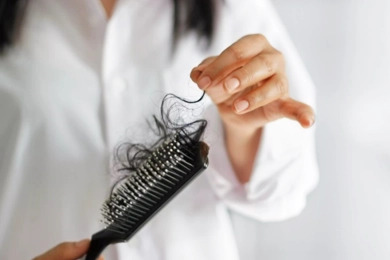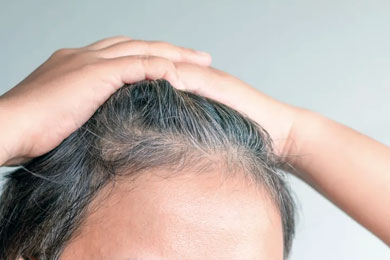
For both men and women, experiencing hair loss can be upsetting. Numerous factors, such as genetics, hormonal changes, medication, illness, and inadequate nutrition, can cause it.
Losing your hair can negatively affect your confidence and self-esteem, which can cause anxiety and depression. The good news is that hair loss can be treated and prevented in a number of ways. We will look at hair loss causes, remedies, and prevention advice in this article.
The most frequent cause of hair loss is hereditary baldness, also referred to as male or female pattern baldness. It is a genetic disorder that can affect both sexes and typically appears in people between the ages of 20 and 30. Female pattern baldness involves scalp thinning throughout, whereas male pattern baldness typically starts with a receding hairline and thinning at the crown of the head.
Unbalanced hormone levels can also result in hair loss. Due to changes in the levels of the hormones progesterone and estrogen, women may experience hair loss during menopause, during pregnancy, or after giving birth. Dihydrotestosterone (DHT),a hormone that can shrink hair follicles and make them stop producing new hair, may increase in men's bodies, causing them to experience hair loss.
Hair loss is another side effect of some medications. Medications that can result in hair loss include antidepressants, blood thinners, and chemotherapy drugs.
Medical conditions like thyroid issues, autoimmune diseases, and scalp infections can all manifest as hair loss as a symptom.
Nutritional deficiencies, such as those in iron, zinc, and vitamin D, can result in hair loss. Hair loss can also be caused by a diet that is lacking in protein.
A common issue that many people experience worldwide is hair loss. Genetics, stress, hormonal changes, diet, and specific medical conditions are just a few of the causes. Hair loss can be upsetting and have an impact on one's self-esteem and confidence. But there are lots of ways to keep your hair healthy and stop hair loss.
Here are some recommendations for preventing hair loss and maintaining strong, healthy hair:
Hair health depends on eating a balanced diet. A well-balanced diet full of vitamins and minerals is necessary for healthy hair. Protein-rich foods like eggs, lean meat, and beans support the health of hair follicles. Salmon, walnuts, and chia seeds are foods high in omega-3 fatty acids that encourage hair growth and stop hair loss. Additionally, iron-rich foods like spinach, lentils, and tofu aid in both preventing hair loss and encouraging the growth of healthy hair.
Braids and ponytails, which pull your hair tightly, can result in hair breakage and traction alopecia. A type of hair loss known as traction alopecia is brought on by persistent pulling or tension on the hair. If you must wear your hair in a tight style, be sure to alternate with looser looks to give your hair a break.
Straighteners, curling irons, and other heated styling tools can break and harm your hair. Use these tools sparingly to avoid heat damage, and always spray on a heat protectant before styling your hair. As much as possible, air dry your hair and stay away from using high heat settings.
Massages of the scalp can encourage blood flow to the hair follicles, promoting the growth of new hair and halting the loss of existing hair. Every day for a few minutes, gently massage your scalp with your fingertips. A scalp massager tool can also be used to encourage blood flow.
Your hair and scalp can become damaged by harsh chemicals found in hair care products like sulfates and parabens. Make use of gentle, natural hair care products devoid of harmful chemicals. Avoid over-washing your hair as this can dry out your scalp and cause breakage by robbing it of its natural oils.
Sleeping enough is important for overall health, which includes hair health. Stress brought on by sleep deprivation can result in hair loss. In order to encourage hair growth and prevent hair loss, try to get at least 7-8 hours of sleep every night.
Control your stress Hair loss is frequently brought on by stress. Your body produces hormones that may have an impact on hair growth when you're under stress. Try incorporating stress-reduction strategies into your daily routine, such as yoga, deep breathing, or meditation. Also, remember to take breaks throughout the day to unwind and lower your stress levels.
Smoking can reduce blood flow to the hair follicles, which can lead to hair loss. Smoking can also harm your scalp and hair, increasing the risk of breakage and hair loss. If you smoke, you might want to think about giving it up to improve both your general and hair health.
You should seek professional assistance if you are losing a lot of hair. Your hair loss can be properly diagnosed and treated with the help of a dermatologist or trichologist. There are many ways to treat hair loss, including prescription drugs, surgical hair transplants, and scalp micropigmentation.
In conclusion, by implementing these suggestions, hair loss can be prevented. a balanced diet, gentle hair products, and staying away from tight hairstyles.
Millions of people experience hair loss on a global scale, which can be embarrassing and make one feel self-conscious. Fortunately, there are lots of hair loss remedies out there, from drugs and supplements to surgical options. In this article, we'll examine the various hair loss treatment options and the factors you should take into account before selecting a course of action.
The FDA has approved the prescription drug finasteride for the treatment of male pattern baldness. It functions by preventing the synthesis of dihydrotestosterone (DHT),a hormone that shrinks and eventually stops hair follicles from growing hair. Orally administered finasteride can stop hair loss in its tracks and, in some cases, even stimulate hair growth. Finasteride is not suggested for women, it should be noted, as it can result in birth defects in an unborn male fetus.
Minoxidil is an over-the-counter drug that is applied topically to the scalp. The effectiveness of this over-the-counter medication has been demonstrated in both men and women. By boosting blood flow to the hair follicles, minoxidil promotes hair growth. It comes in a variety of strengths and forms, including liquid and foam. The effects, however, are frequently transient and take several months to manifest.
Dutasteride: A prescription drug, dutasteride inhibits the production of DHT in a manner similar to finasteride. Its use for treating hair loss is off-label because the FDA has not approved it for that purpose. Although dutasteride may be more efficient than finasteride, it also carries a higher risk of side effects, such as erectile dysfunction and a decreased libido.
Medications called corticosteroids are frequently used to treat inflammatory diseases like arthritis and asthma. They can also be used to treat autoimmune diseases like alopecia areata that cause hair loss. The scalp is typically injected with corticosteroids, which have been shown to be effective in promoting hair growth. They may, however, also cause adverse effects like thinning skin and immune system weakness.
Hair Transplantation: In hair transplantation, the balding areas are covered with hair that has been removed from a donor site (typically the back of the scalp).
 Causes of Hair Loss in Man
Causes of Hair Loss in ManA sizable percentage of males suffer from hair loss, a normal yet frequently upsetting condition. This thorough book explores the many factors that contribute to male hair loss, providing information and und ...
 Unveiling the Mystery: Understanding Hair Loss in Women
Unveiling the Mystery: Understanding Hair Loss in WomenOur comprehensive examination of hair loss is a subject that affects a great number of women worldwide. We will examine the various complex causes of hair loss in women in this blog post, including lifestyle ...
 Stress, Anxiety And Hair Loss: Are They Related?
Stress, Anxiety And Hair Loss: Are They Related?Millions of people around the world struggle with the common problem of hair loss. Many people wonder if anxiety and psychological stress can also cause hair loss, which can be brought on by numerous factors ...